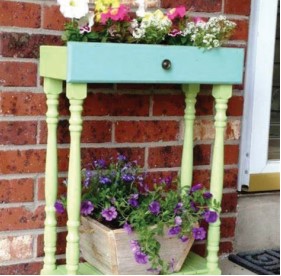Spring Cleaning Tips
How to carefully prune for sustainable upkeep

An old dresser is repurposed into a flowerbox. Picture from allideen.
March 16, 2023
Spring break is often the time when closets are unpacked and reshuffled, bedrooms and kitchens are rearranged and redecorated, and all our old junk is thrown into black trash bags, never to be seen again. But while our houses may look spotless after tidying up and tossing out, the planet we call home only grows more dirty.
Inevitably, the entity that takes care of our waste is Earth and its natural cycles and seasons, not landfills or incinerators or re-sale store clerks. Our junk—and whether it’s junk or not is debatable—has to go somewhere, and that somewhere will almost always be a spot on our finite globe.
As our world faces more and more of the damaging effects of global warming, it’s become increasingly important to consider how your actions contribute to making the planet hotter. Sustainability isn’t just saving the world though—it’s also cheaper for you. Repairing things rather than replacing them can save you a ton of money—something especially important in the state of our current economy.
Luckily, there’s plenty you can do this year to be eco- and wallet-friendly.
To start, you can simply not do a few things. For example, don’t throw old batteries away, as they contain non-renewable, valuable metals that can be reused. Bring them to Lowe’s, Home Depot, or another hardware store that recycles them instead. You can also hang on to old items and re-purpose them for another project, as seen in the pictures below.
If you’ve already saved up to purchase some new items, check out sustainable options before you break the bank all over again. A great place to start is re-sale stores, where you can buy furniture, clothing or cleaning supplies that would otherwise end up in the trash for a discount price.
An article from Choose to Reuse points out that “secondhand goods [can be] up to 50% cheaper” than items from regular retail stores. This steal becomes even sweeter when Choose to Reuse says, collectively, Americans “spend over a trillion dollars annually on nonessential goods.”
Look for bulk supplies in the supermarket like cloth napkins instead of big rolls of paper towels. And if you’re restocking the pantry, pick out beans or grains that won’t spoil for months.
Perhaps the best thing you can do to keep clean this Spring is pick up some handy hobbies.
Socks with holes can be easily patched by even the most amateur of sewers—same for buttons that have fallen off shirts and pants. There are also plenty of tutorials online for fixing up old furniture, repairing malfunctioning tools, or simply re-using random junk.
As Climate Cafes states, “Engaging in eco-friendly hobbies and learning sustainable skills can benefit the environment and personal benefits, such as improving mental health, building a sense of community, and saving money. By embracing eco-friendly hobbies and sustainable skills, individuals can protect the planet and create a more sustainable future.”
Spring cleaning shouldn’t be synonymous with replacing ripped up socks or shirts for new ones that will almost certainly get the same treatment next season (or sooner!). Instead, we should see it as a time to utilize skills and tools to further appreciate both ourselves and what we already own.



